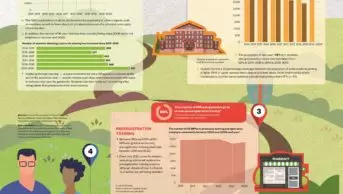After over a decade of a rewarding and varied career working in an acute setting and then as a senior pharmacist at a clinical commissioning group (CCG), I felt ready to take on new challenges within the profession. To help broaden my horizons, I secured an NHS executive mentor to enhance the scope of my perspective. I had no idea that this would be pivotal to my next career move and lead me to a role outside of the pharmacy profession. I made, what felt like a brave decision, in applying for a project manager role within the CCG. This would not have been possible without my mentor giving me the courage to do so; despite working in the CCG for a few years, I lacked the awareness of the work my colleagues in different teams were engaged in.
I spent the next three years working on change management programmes with members of the executive team in the CCG, ultimately being talent spotted and starting a role leading risk management for our organisation. Following the move, I achieved two promotions in a short period.
By virtue of the profession, pharmacists inherently possess a diverse set of skills that can be applied to different domains of work within the NHS and have a profound impact on patient care. These skills include being detail focused, process driven, having governance embedded into our core, as well as safety considerations. Taking the risk of moving out of the pharmacy comfort zone has provided me with more opportunities to develop in other areas, widened the pool of people who I interact with and refined my skills through application in different contexts.
Working with and learning from senior leadership in the management side of the NHS has provided insights into aspects that we may not be doing enough of in our profession. Below is a snapshot overview, highlighting a few of the lessons I’ve learned:
1. There’s value in stepping out of our job descriptions to take on other tasks outside of what pharmacists traditionally do
Do we adhere too strictly to our boundaries instead of being receptive to opportunities that could support career development? Should managers permit staff to explore opportunities beyond their designated roles? Perhaps we need to remove these barriers to enhance the strength of the workforce and provide more resilience to the ever-changing NHS landscape.
2. Senior leaders in other professions openly share and be transparent about the areas of work they are involved in
Are we still being hierarchical in our approach by withholding information about the leadership team’s work from junior members of staff, leaving them blind to the expectations of them as they strive to advance their careers?
3. All team members have integrated exposure to diverse tasks, such as report writing and preparing papers for committee meetings
Are pharmacists in leadership positions giving middle management enough exposure to these types of work? How can 8As and 8Bs demonstrate these skills at interview when they have had no previous exposure?
4. Eligibility to apply for more senior roles does not necessarily require years of experience at certain grades
Do we still have traditional thinking about years of experience needed before considering pharmacists for promotions? Is this leading to a backlog of overqualified pharmacists stuck in middle management positions?
Maybe these intentionally provocative questions provide food for thought for our profession.
Tara Patel, head of assurance, NHS South East London
You may also be interested in

‘Embrace the squiggle’: advice for my younger self

How to make the most of 2021
